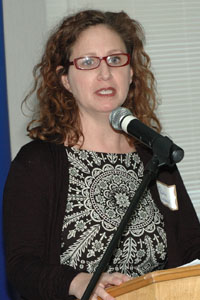What’s up at the Supreme Court?
 Dahlia Lithwick, a renowned journalist and expert on the Supreme Court, addressed questions such as, “What health reform cases will be coming up in this important election year?” and “What other major cases are in the pipeline?”. Listen to this fascinating talk by clicking below.
Dahlia Lithwick, a renowned journalist and expert on the Supreme Court, addressed questions such as, “What health reform cases will be coming up in this important election year?” and “What other major cases are in the pipeline?”. Listen to this fascinating talk by clicking below.
Ms. Lithwick is a senior editor at Slate Magazine, and in that capacity, writes the “Supreme Court Dispatches” and “Jurisprudence” columns. Her work has appeared in the New York Times, Harper’s, The Washington Post, and Commentary, among other publications. She received the Online News Association’s award for online commentary in 2001 and again in 2005 for a series she co-authored on torture.
Dahlia was the first online journalist invited to serve on the Steering Committee for the Reporters Committee for Freedom of the Press. She was editor of The Best American Legal Writing of 2009 and the co-author of “Me v. Everybody: Absurd Contracts for an Absurd World,” a legal humor book. In addition, she has written “I Will Sing Life: Voices from the Hole in the Wall Gang Camp,” a book about seven children from Paul Newman’s camp with life-threatening illnesses. She lives in Charlottesville with her husband and two sons. Following the presentation, questions were taken from the audience. The program was moderated by SSV board member Grace Zisk.
Program Summary
Dahlia Kithwick began by observing that this session is shaping up to be the most extraordinary term of the US Supreme Court. She also commented on her own job, that there are only about 20 of us covering the Supreme Court, and once you get the job of being a Supreme Court correspondent you stay on it often for decades (this is her 13th term and yet she is the youngest on the beat). It really is the single greatest beat to have in journalism, and also a terrific beat for women–especially for those with small children–no running out for emergencies at midnight.
This institution represents a paradox: the court has always and will be two things at the same time: it is a lofty apolitical institution, and at the same time it is an eminently political institution (these are political appointments to achieve political ends). Both of these are completely true and completely not true. Decisions are overwhelmingly unanimous–not a court fractured along political lines. Yet at the same time it is a very, very partisan court and bitterly divided on hot-button issues, and next year will be the most bitterly divided we have seen since Bush v. Gore. They were absolutely stunned by the blowback following their decision on the Citizens United campaign finance case.
Some of the most epic cases ever are being heard: the Affordable Care Act (and it is extraordinary that this case will be argued and decided in an election year, but the court had no choice); the Arizona Immigration case (police can stop you and demand your papers–the issue is really one of Congressional power–the constitution gives Congress, not the states, the power to set uniform rules of naturalization); the Texas redistricting case; the GPS satellite case (a very important privacy-technology case where the police attached a GPS device to a suspected drug dealer without a warrant); the Texas affirmative action case (calling to question whether affirmative action in higher education will continue); California’s Proposition 8 anti-Gay marriage initiative and the defense of marriage act cases; and finally, a case that is not as consequential but very funny dealing with fleeting expletives and bare buttocks!
The real challenge for the Court in the coming months is to signal to the world that it really is a nonpartisan institution during a period when it will confront five to seven hot-button ideological issues. Ms. Lithwick predicted the court will uphold the healthcare act, the Arizona immigration law, and gay marriage–but all on 5 to 4 decisions.
